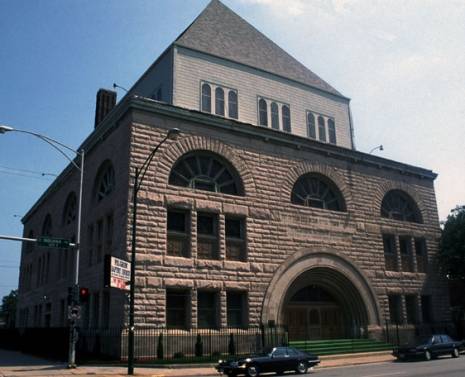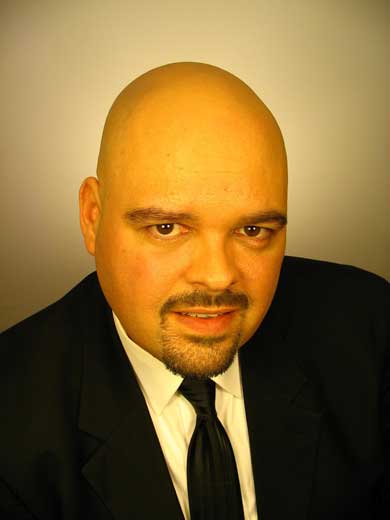Gospel News & Notes
Crossing Over: Gospel Giant Sherman Washington of the Zion Harmonizers
Sherman Washington Jr., the leader of the Zion Harmonizers New Orleans’ longest running gospel vocal group since the 1940s, and the godfather of the New Orleans Jazz and Heritage Festival’s Gospel Tent (the Harmonizers played the first Jazz Fest in 1970, when it was located at what is now Armstong Park), died on March 14 at his home in Boutte, LA, after a long illness. He was 85.
For three decades, Mr. Washington hosted a Sunday morning gospel show on WYLD-AM that served as the gospel community’s town hall. After the festival moved to the Fair Grounds in 1972, he oversaw the growth of the Gospel Tent, building it into a cornerstone of the festival’s roots-music presentation.
The Zion Harmonizers, ‘Fly Away’Until deteriorating health finally slowed him down in recent years, he administered the Gospel Tent with a steadfast integrity and intimate knowledge of the music, musicians and singers. Given that many acts consist of large choirs, the tent features more performers than any other stage at the festival.
"Gospel, even after jazz and blues came down to the front of the bus, was still in the back of the bus," said Jazz Fest producer/director Quint Davis. "To a large extent, Sherman’s work through the Gospel Tent has helped bring gospel music to the front of the bus. An enormous debt is owed to him by the festival, and the whole gospel world.
"You can talk about soul with either a lower-case 's' or an upper-case 'S,'" Mr. Davis said. “Sherman had soul with a capital S."
Mr. Washington grew up in the church. His father was a minister at the Morning Star Baptist Church in Thibodaux. Washington joined the Zion Harmonizers in 1941, two years after the group’s formation; his brother Nolan, who passed away in 1997, sang alongside him.
The Zion Harmonizers with Aaron Neville at New Orleans’ Jazz Fest, 1991. Clip from Let the Good Times Roll: A Film About The Roots of American Music (1992)When Harmonizers leader Benjamin Maxon left the group in 1943 to preach full time, Mr. Washington stepped up, reluctantly, as the new leader. "I was scared," he recalled in 2002. "I felt like I wouldn’t be able to do it. It’s a lot of responsibility."
He worked in the tailor’s shop at the old Stein’s clothing store at Carondelet and Canal streets and sang with the Harmonizers on the weekend. During a hitch as an Army truck driver during the Korean War, he developed a taste for country music. When Willie Nelson performed at the Jazz Fest’s black-tie gala years ago, Mr. Washington was front and center.
"I’m a Western man," he once said. "I stayed in Korea for 17 and a half months. I didn’t hear nothing but Western, and I fell in love with it."
After the Korean War, he returned to New Orleans and went to work for the construction firm Boh Bros. as a truck driver, a job he held for 43 years. He raised a daughter who is an anesthesiologist and two sons who worked for the Postal Service.
But he was also the de facto father of a much larger family. His Sunday morning gospel show on WYLD-FM announced anniversary concerts and birthdays, news and notes, and spun a program of mostly local gospel records. Callers rang just to say hello.
In the late 1960s, the Harmonizers roster included a Mississippi-born bass singer named John Hawkins. In early 1970, Hawkins met Quint Davis at Mason’s Hotel on Claiborne Avenue and came back to Mr. Washington with news of this young music fan who was organizing a music and heritage festival.
Mr. Washington went to meet Davis and partner Allison Miner, and the Zion Harmonizers were booked for the first Jazz Fest at Congo Square. The forerunner of today’s Gospel Tent was a 15-by-20-foot open-sided tent with an upright piano and no floor, stage or sound system.
The Zion Harmonizers, ‘I Couldn’t Hear Nobody Pray’When Jazz Fest moved to the Fair Grounds in 1972, Davis approached Mr. Washington with an idea. "Quint said, ‘I had a dream,’” Mr. Washington recalled. "And I thought, ‘This isn’t Dr. King, is it?’ He said, ‘I had a dream that I’m going to build a Gospel Tent, and I want you to run it.’ "
Mr. Washington’s diplomatic skills came in handy. In the early 1970s, gospel choirs rarely performed outside of churches or church functions. They certainly didn’t perform at "hippie" events where beer was served. Pastors resisted the idea of choirs performing at Jazz Fest.
"The preachers were against me," Mr. Washington said, "because people would drink beer in the Gospel Tent. I would ask the choir’s president or manager, and he’d tell me yeah. Then he’d come back and say, ‘Our pastor doesn’t want us to sing in the Gospel Tent.’ "
So instead of church choirs, Mr. Washington booked vocal quartets that weren’t affiliated with churches.
"Those are the ones I had to depend on," he said. "They would tear the place up, pack it out. We didn’t pay those preachers no mind. We kept going.”
Opinions eventually changed and choirs lobbied Mr. Washington to be included. "I think the choir members got on the pastors about it. Because if a person drinks a beer or something, that’s their soul, not yours. If you’re singing, you’re doing what God wants you to do."
Eventually, a small staff was assigned to assist Mr. Washington, but he still screened most acts in person. He attended rehearsals and private auditions, offering advice along the way.
"He had never been in a role like this," Mr. Davis said. "He was a true man of God who was not in it to advance himself or build an empire. He worked through his community and spiritual connections to put it all together. He knew who was the real deal, who needed to play."
Mr. Washington insisted on a high level of professionalism and skill, as he knew any group could well be some Jazz Fest’s attendee’s first exposure to gospel. He wanted the music to make a good first impression.
“This Gospel Tent has brought more white people to gospel than anybody had ever seen, " Mr. Washington said in 2002. "Now, it’s more white people than black people. And they get into it. It brings the white and black together. People get together and stand up, you don’t know who is who."
After hearing gospel music at Jazz Fest, European festival promoters started booking choirs for overseas tours. The Zion Harmonizers, known for their matching, brightly colored suits, made their first trip to Europe in the 1980s for a Swiss festival. The group celebrated its 72nd anniversary on March 27 at New Home Missionary Baptist Church.
As Mr. Washington’s health declined, he limited his stage time. During gospel brunch performances at the House of Blues in recent years, he only appeared for a few songs.
But even as he ceded administration of the Gospel Tent, he still consulted with the new producers and made the rounds at the Fair Grounds in a wheelchair.
He realized the Gospel Tent, and its mission, was larger than any individual. Years ago, he expressed hope that his successor would continue in the spirit that guided him.
"These younger people are much different from me, even the younger guys in my group, " Washington said. "I hope that they would have patience, try to help somebody. I hope."
Survivors include his wife, Shirley; two sons, Sherman Washington III of New Orleans and Byron Washington of Los Angeles; a daughter, Denise Jolly of Atlanta; nine grandchildren; and four great-grandchildren.
(from reporting by Keith Spera, New Orleans Times-Picayune)
***
Rebuild of Pilgrim Baptist Church: ‘On Again’
The on-again, off-again reconstruction of a landmark Chicago church known as the birthplace of gospel music is on again.
Church leaders have announced work to rebuild the fire-ravaged Pilgrim Baptist Church will begin in earnest this summer.
A 2006 fire ignited by workers repairing the roof devastated the 120-year-old structure designed by famed architects Dankmar Adler and Louis Sullivan.
Officials announced a $37 million rebuilding plan in 2008, but nothing came of it. Pastor Tyrone Jordan says a first construction phase set for a 2012 finish will "prove to the world" the church will rebuild.
The four-phase project is expected to cost at least $30 million.
Mahalia Jackson, Sallie Martin, the Rev. James Cleveland, and the Staples Singers are among those who have sung at the church.
***
Dan Keeton is disbanding The Keetons and joining Gold CityDaughter’s Illness Takes Gold City’s Brent Mitchell Off the Road; Dan Keeton Named Group’s New Tenor
As reported in Singing News, Brent Mitchell is leaving the road to devote more time to taking care of his newborn daughter, and is being replaced in Gold City by Dan Keeton, formerly of The Keetons, which will be disbanding. In January, Mitchell and his wife Heather , welcomed a new baby girl, Paislee, into their family. Brent says, "My 3 month old daughter, Paislee, has been very sick for the past few weeks and I feel I need to be with my family at this time. Family has always come first in my life, but I am so sad to leave my dream job. I did not think it was fair to Gold City for me to hold them back not knowing the future health of my little girl. Please pray for my family and for Paislee, that she will get through whatever her little body is going through right now. I will miss GC and cherish the little time I had there!"
The Keetons, ‘It Won’t Be Long,’ in concert in High Point, NC, September 26, 2010. Tenor Dan Keeton (at left in video) is disbanding the group and joining Gold City as its new tenor singer.Gold City’s Daniel Riley says, "We will miss Brent. During his time here we have grown to love him. He will always be a part of the Gold City family. I know this was a very hard decision for him, but I admire him for making the right decision."
In an open letter posted on his website, Keeton explains his decision to disband The Keetons and to join Gold City:
When I was 16 years old, I began singing with my first Gospel Quartet. I had already been through a childhood of pain and heartache. I had to grow up really fast. But, Grandma's box of Gospel Music and the music I heard on the radio, gave me some real heroes to look up to. I heard on the radio that the Gold City Quartet was coming to Beaver Dam, KY. That was only 25 minutes away! I had just bought my first car, a green and rust Plymouth Volare'. I filled up with gas, bought a Coke and headed off to Beaver Dam. I got to the church 4 hours early! I waited in the parking lot for Gold City to arrive in the bus. I waited but, when they had not arrived after 30 minutes, I decided I needed another Coke. I started driving down the road toward the corner store and coming toward the church was the big bus. I whipped her around, pulled in behind the bus and jumped out to meet The Gold City Quartet. Off they came; Brian Free, Ivan Parker, Gary Jones, Mike LeFevre and the man, Tim Riley!
The music, the band, the voices and the message I heard that very night removed all doubt. I prayed all the way home that God would allow me to sing with a quartet "just like" that one. It might take 26 years, or it might not be exactly what you asked for but, God does answer your prayers. As of Monday, March 28th, 2011, I retired and disbanded "The Keetons". Nancy is doing what she loves, being a High-Risk Labor and Delivery RN. Jim Sheldon will follow his calling in a full time music ministry and your friend, Dan Keeton, has accepted the position of Tenor in the one and the only Gold City Quartet!
Thank you so much for your prayers and support of The Keetons. Please come see me soon with Gold City!
Founder/Publisher/Editor: David McGee
Contributing Editors: Billy Altman, Laura Fissinger, Christopher Hill, Derk Richardson
Logo Design: John Mendelsohn (www.johnmendelsohn.com)
Website Design: Kieran McGee (www.kieranmcgee.com)
Staff Photographers: Audrey Harrod (Louisville, KY; www.flickr.com/audreyharrod), Alicia Zappier (New York)
E-mail: thebluegrassspecial@gmail.com
Mailing Address: David McGee, 201 W. 85 St.—5B, New York, NY 10024





